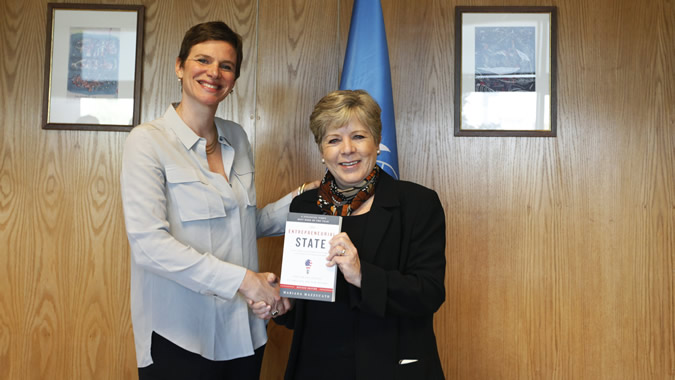Latin America has a “massive private sector problem” with companies that profit from an excessively cozy relationship with the government but fail to invest enough, a leading international economist has warned.
Mariana Mazzucato, a professor of economics at University College London who is advising the governments of Brazil, Barbados, and Colombia, told the Financial Times that companies in the region invested too little in research and development.
“They have benefited from massive rents and subsidies, whether it’s natural resource rents or protectionism or nepotism,” the Italian-American-British economist said in an interview while visiting Colombia. “I think one of the biggest challenges is to get the private sector to do its job, which is to be a capitalist private sector.”
Latin America’s economies were dominated by “very strong monopolies” that made excessive profits, she argued — a conclusion supported by a UN regional report, which found that markets in Latin America tend to be dominated by a small number of giant firms with high levels of market power.
Instead, governments should develop “mission-oriented” strategies across industrial sectors and ministries, she said. These could solve specific challenges, such as sustainable mobility or adding value in an environmentally friendly way to commodity exports, rather than supporting particular industries.
Mazzucato believes that stronger, more empowered states can use tools such as conditions on public subsidies, investment or intellectual property rights to drive strategy. She cites Germany’s development of green steel, using its state development bank KfW to make loans conditional on the introduction of environmentally friendly technologies.
But she rejects the idea that increased government intervention may represent a particular risk in Latin America, a region with relatively weak institutions and high levels of corruption.
“There is a very condescending way that the global north looks at the global south, whether it’s Africa or Latin America, and sees a lot of corruption,” she insisted. “There’s huge amounts of corruption — it’s just paid and legal — in the US, the lobbies, huge amounts of corruption in the UK, just read the papers”.
Mazzucato highlighted the decision by Colombia’s leftwing president Gustavo Petro to halt new oil and mining exploration and try to pivot the economy to agriculture and sustainable tourism. Colombian business leaders have fretted that Petro is hurting the economy by moving away from oil and gas too fast, with growth slowing sharply as a result.
Petro’s policy contrasts with other Latin American economies such as Brazil, Argentina, Guyana, and Venezuela, which are increasing oil and gas output substantially to maximize government revenues before the world moves away from hydrocarbons.
“The Colombian narrative and framing are more consistent with the country being serious about climate,” Mazzucato said. “Colombia’s the model, but their model will only work if they get their acts together to have an inter-ministerial strategy” — coordinating policy more effectively across government.
The economist argues that the strong state direction of the economy to meet specific challenges matters more than whether a particular industry is in public or private ownership. When public leadership is absent, she said, “or you’ve got a bunch of private sector companies being very good at complaining about tax and red tape and. … sitting on their ass expecting rents, that’s not going to work”.
A recent report from the UN Economic Commission on Latin America and the OECD highlighted sluggish public and private investment in most Latin American countries and low levels of national savings. It said total investment only reached 20 percent of gross domestic product on average in 2022, against 23 percent of GDP in high-income economies and 40 percent in emerging and developing Asia.
Mazzucato sees Latin America’s abundant water supplies, extraordinary biodiversity, and ability to fight climate change as its best economic opportunity.
Her advice on how to make this happen? “Turn the current social and economic challenges into the biggest wave of public and private investment ever. But this will never happen without state capacity… and a new dynamic deal that is symbiotic, not parasitic with the private sector.” (https://www.ft.com/content/7634a92f-ef08-4416-824a-f1baba39bd31)



































